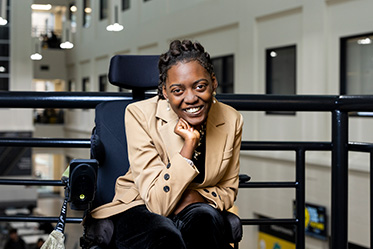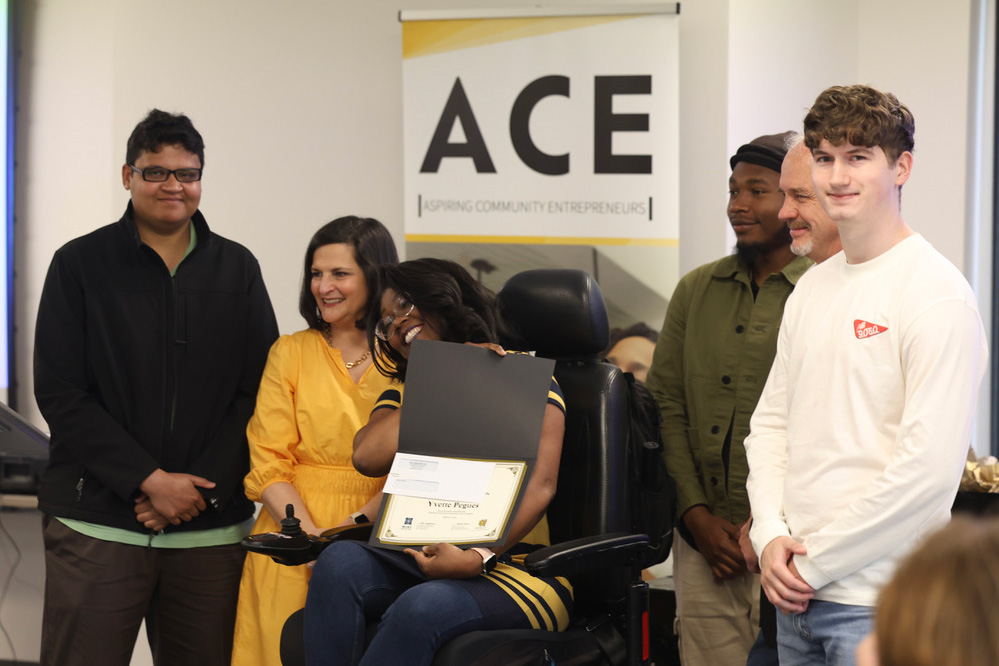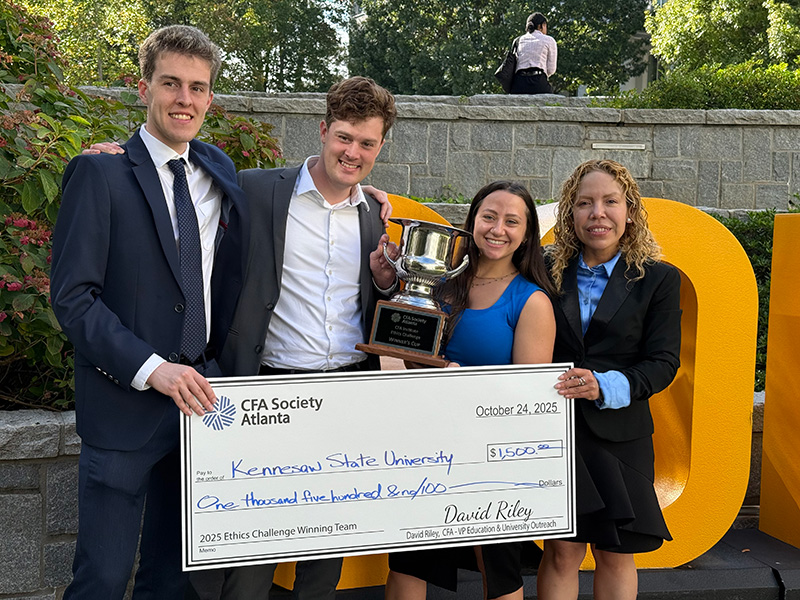

KENNESAW, Ga. | Apr 13, 2018

For poor women living in the slums of Pune, India – many trapped in high-interest predatory loans – financial independence can feel like an impossible dream. However, a former commercial banker has used microloans and related services to give thousands of Indian women the tools to escape poverty.
Dr. Medha Purao Samant is the founder of Annapurna Pariwar, a group of five independent development organizations dedicated to helping poor Indian women find economic success. Samant was the featured speaker at the eighth annual Pathways to Peace event, held April 10 in the Social Science Building.
Pathways to Peace is an interdisciplinary program sponsored by the Michael J. Coles College of Business, Office of the Provost, the Interdisciplinary Studies Department, and Enactus. Each year, the program brings guest speakers to talk with Kennesaw State University students about promoting meaningful, lasting peace around the world.
During her presentation, entitled “The Role of Microfinance: Empowering Women in India,” Samant told the story of how she left a comfortable 13-year career in commercial finance to pursue her passion for helping women on the margins of society gain financial independence.
Her journey began in 1993 when she befriended several women who sold vegetables in the slums of Pune.
“I could see there was scarcity in their lives around everything,” she said. “No food, no water. There was scarcity everywhere. The only thing I could see that was not scarce was their fighting spirit.”
Samant, who is the daughter of respected Indian activists, learned that the women were borrowing money from local lenders to fund their vegetable stands, often paying 20 percent or more in interest. They could not borrow from traditional banks because they did not have any assets to use as collateral.
Realizing that these people needed help to escape the cycle of predatory lending, Samant organized a group of nine local vegetable vendors and loaned them each 1,000 rupees interest free. All that was required to receive the loan was for other members to vouch for the borrower. After 50 days, each borrower paid her loan back in full.
After this initial success, Samant wanted to expand her project to help more people. She established Annapurna Mahila Mandal, a charitable trust offering low-interest microloans to poor Indian women. She quit her job at the Bank of India to focus all her time on the program.
“I knew nothing about how microfinance solutions worked when I started offering small loans 25 years ago,” Samant said. “There were no microfinance solutions like this in India at the time. I only had the passion to bring banking to the poor.”
As Samant gained more experience in microfinance, her organization grew significantly. During the last 25 years, her business has loaned more than $12 million to 66,000 people. She eventually established Annapurna Pariwar, which provides additional financial services for poor women, including low-cost medical insurance, life insurance, childcare, housing, and pensions. Annapurna Pariwar has helped more than 100,000 people. Many of the staff are women who have received assistance from the organization.
Samant says the goal of Annapurna Pariwar is not to provide charity to its members, but instead to give women the power to become self-sufficient.
“There is no charity in this,” she says. “We do not give women fish every day. We give them fishing rods and teach them how to fish.”
Dr. Sheb True, Senior International Officer for the Coles College of Business and co-founder of the Pathways to Peace program, met Samant while in India attending a conference on social entrepreneurship. He invited her to Kennesaw State to share her powerful story.
“It’s easy to travel places and have your heart moved,” he said. “The reason she is here is not because she has moved our heart, but because we are impressed by what she’s done. When we see the neighborhoods and slums where these people come from, the results are truly impressive.”
Before returning to India, Samant also participated in a panel discussion at IgniteHQ on social entrepreneurship alongside two visiting faculty from the Tata Institute of Social Sciences in India. The panel is part of Kennesaw State University’s Year of India, a yearlong study of India’s history and culture running throughout the 2017-2018 academic year.
The Coles College of Business plans to continue its relationship with Samant beyond Pathways to Peace. In October 2018, Nick Smith, a student in the Master of Business Administration/Master of Public Administration dual degree program, will travel to India to conduct research with Annapurna Pariwar and the Tata Institute.
True concluded the Pathways to Peace by encouraging students in attendance to learn more about how microfinance and other social entrepreneurial practices can lift people around the world out of poverty.
- Patrick Harbin

Kennesaw State Graduating Senior Using Innovation to Support Autistic Students

"One Day, I Will": Brianna Jackson's Unstoppable Journey to a Future in Tech

ACE Program Announces New Projects to Expand Entrepreneurial Opportunities

KSU Student Managed Investment Fund Secures First Place at 2025 CFA Ethics Challenge